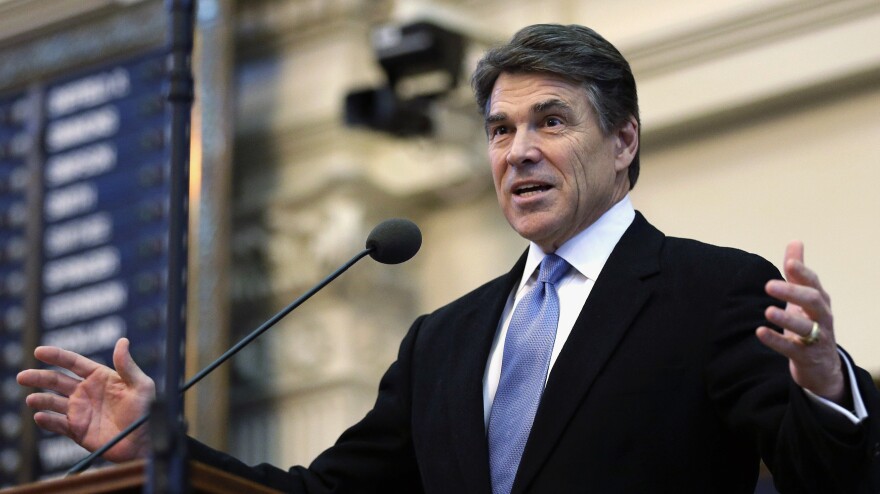The state of Texas is turning down billions of federal dollars that would have paid for health care coverage for 1.5 million poor Texans.
By refusing to participate in Medicaid expansion, which is part of the Affordable Care Act, the state will leave on the table an estimated $100 billion over the next decade.
Texas' share of the cost would have been just 7 percent of the total, but for Gov. Rick Perry and the state's Republican-dominated Legislature, even $1 in the name of "Obamacare" was a dollar too much.
"Texas will not be held hostage by the Obama administration's attempt to force us into this fool's errand of adding more than a million Texans to a broken system," Perry said.
Texas Republicans have moved steadily to the right — to where the very concept of public health insurance of any kind is looked at through narrowed eyes. Still, it's not easy to walk away from $100 billion from the federal government to help your state's poor, elderly and disabled, especially when you have powerful stakeholders like hospitals, doctors and cities clamoring for the state to take the money for their sakes.
Texas hospitals stand to lose about $7 billion.
"I don't think we will be OK, actually, especially when you consider the state cut us about $700 million a year in Medicaid payments because of the budget shortfall," says John Hawkins, a senior vice president at the Texas Hospital Association. "Now we're dealing with sequestration, which is another 2 percent.
"If you look at the president's budget, there's some additional cuts to hospitals, so I don't think it is a sustainable business model going forward if we don't do the expansion."
If your country has no national health insurance but your citizens don't have the stomach to watch the uninsured die on the hospital sidewalk, something's got to give. So there's a national expectation that doctors and hospitals will provide these uninsured populations mostly uncompensated care — and so they do. But few in the industry think this is the way to operate.
Tom Banning, chief executive officer of the Texas Academy of Family Physicians, lobbied hard but unsuccessfully for Medicaid expansion. He's beside himself with frustration.
"These people don't choose to get sick. When they do, they're going to access our health care system at the most inefficient and expensive point, which is the emergency room," Banning says. "And it's going to cost the taxpayers, and it's going to cost employers a lot of money to care for them. And we're going to be forgoing billions of dollars that the feds have set aside for the state to pay for and provide this care."
This is not about money — if it were, Texas would be taking it. This is about Obamacare. It's widely believed in Austin that Perry is seriously considering another run for president — this time without the "oops." His base is Tea Party Republicans across the country. While it might cost $100 billion for the privilege, Perry is going to be able to stand in front of them and say, "I said no to Obama when he tried to bribe my state with health care coverage for the poor."
And since it's widely believed that these would-be Medicaid recipients probably don't vote or, if they do vote, they vote for Democrats, there's no political price to pay for snubbing them.
Still, there are some Republican legislators who feel bad about not taking the money.
Rep. John Zerwas tried to craft some sort of compromise that never mentioned Medicaid expansion, but he couldn't get it out of committee — because for Texas Republicans, the very words "health care" now carry the stink of Obamacare.
Zerwas points to "the political realities of having to run for office again in two years, and how much explaining would I have to do as a candidate around a vote that could very easily be framed as a supporter of promoting Obamacare."
Texas Republicans aren't worried about the reaction from the left for voting down Medicaid expansion; they're worried they might get a primary challenge from a Tea Party candidate if the words "health care" pass their lips on the floor of the Legislature. That is, if they're not already a Tea Party candidate, which many are.
For at least the next two years and probably longer, Medicaid expansion in Texas is dead. What this all means is that more than a million Texans who might have received health care coverage will remain one serious illness or one bad accident away from bankruptcy. And an estimated $100 billion that would have been spent buying health care in Texas will now go somewhere else.
Copyright 2021 NPR. To see more, visit https://www.npr.org. 9(MDA3OTgyNDI4MDEzMTM0MjQzMTZlNDI0Mg004))



